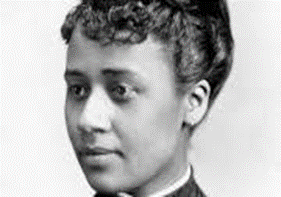Dear Readers,
To continue our celebration of the Black History Month in the US, we are sharing information on Anna Julia Cooper. At the end of this blog, please see a lecture on Cooper followed by a list of references.
As Black women, our stories have long been overlooked and our voices quieted (Duster, 2021). We stand on the shoulders of countless brave women who defied societal barriers to pave the way for future generations. One such inspirational figure is Anna Julia Cooper (1858-1964), a prominent Black scholar and educator whose seminal work, A Voice from the South, speaks to the core of Black women’s experiences even today.

Cooper was born in 1858 to an enslaved Black woman in Raleigh, North Carolina. She personified the intersections of race, gender, and class domination. Yet she transcended these barriers through her pursuit of education. In 1925, Cooper became the fourth US Black woman to achieve a PhD when she successfully completed her doctoral program in 1925 in the Sorbonne, Paris.
Before traveling overseas to conduct her research, Cooper worked as a teacher and principal in Washington D.C. She also became the legal guardian of her great-grand nieces and nephews, risking her career aspirations to ensure their wellbeing. As writer Karen Baker Fletcher notes, A Singing Something: Womanist Reflections on Anna Julia Cooper, Cooper represents a classic double bind for African American women whose call to mothering often interrupts their intellectual callings. This tug-of-war between familial and professional duties remains an all-too-familiar dilemma for Black women navigating academia and leadership roles today.
Cooper was also known for boldly speaking truth to power. She openly criticized W.E.B. DuBois for his statements about Black women, writing “Only the BLACK WOMAN can say ‘when and where I enter…then and there the whole Negro race enters with me.’” (Cooper, 1892. For additional insights, see Hubbard, 2009). Her advocacy exemplified the womanist values of self-empowerment and solidarity with the collective liberation struggle.
In her 1892 book A Voice from the South, Cooper wrote: “The colored woman of today occupies … a unique position in this country. In a period of itself transitional and unsettled, her status seems one of the least ascertainable and definitive of all the forces which make for our civilization.”
Furthermore, Cooper’s extensive body of written works – spanning four books and dozens of speeches and articles – tackled issues of race, gender, education and their intersections. (See Howard University, “Digital Howard”) She centered the specific plight of Black women while also foregrounding their strength and conviction as change-makers. As a contemporary of Cooper, DuBois is often seen as a classic example of “Black” intellect. Despite her body of work, Cooper is still often overlooked. (Alridge, 2007)
She argued that Black women straddled a divide between the old and emerging cultural order, between their roles as women bound by tradition and their roles as early entrants into professional and public leadership spheres. This sentiment continues to find echoes over a century later.
Ultimately, Anna Julia Cooper leveraged her platform, privilege and proximity to power to uplift Black women and other marginalized groups. Her advocacy took place across pulpits and podiums nationwide as well as through her role as President of Frelinghuysen University in Washington DC – a school providing education access to working adults in the Black community.
From fostering young relatives to enduring the stress of risking her job to complete her PhD, Cooper is a reminder for Black women that we have always had to overcome incredible odds. In a day when the toll upon Black women’s bodies is seen as being too severe and untenable, Cooper is yet a reminder. Despite the absolute “Hell” Black women often endure, we can boldly affirm David’s proclamation, “[We are] wonderfully and fearfully made!” (Ps. 139:14, NIV)
By Dr. Nash for the Misogynoir to Mishpat (M2M) Research Network (c) 2024
Recommended Readings on Anna Julia Cooper:
Alridge, Derrick P (2007). ”Of Victorianism, Civilizationism, and Progressivism: the Educational Ideals of Anna Julia Cooper and W.E.B. DuBois, 1892-1940,” History of Education Quarterly, vol 47, no. 4, 416-446
Bell, Kathryn Sophia (2023). “Anna Julia Cooper,” The Stanford Encyclopedia of Philosophy (Winter 2023 Edition), Edward N. Zalta & Uri Nodelman (eds.), https://plato.stanford.edu/archives/win2023/entries/anna-julia-cooper/
Cooper, Anna Julia (1892). A Voice from the South. New York: Oxford University Press.
Duster, Michelle (2021). “Obstructing Black Women’s Voices is a Form of Race-based Violence,” Ms. Magazine.
Fletcher, Karen Baker (1994). A Singing Something: Anna Julia Cooper and the Foundations of Womanist Theology.Crossroad Publishing.
Howard (Digital) University, “Published Materials by Anna Julia Cooper,”
Hubbard, LaRese C (2009). “When and Where I Enter: Anna Julia Cooper, Afrocentric Theory and Africana Studies,” in the Journal of Black Studies, SAGE Publishers, vol 40, no. 2, 283-295
Johnson, E. Patrick (2000). Appropriating Blackness: Performance and the Politics of Authenticity. Raleigh, NC: Duke University Press.
May, Vivian M. (2007). “Anna Julia Cooper, Visionary Black Feminist: A Critical Introduction.” New York: Routledge.

